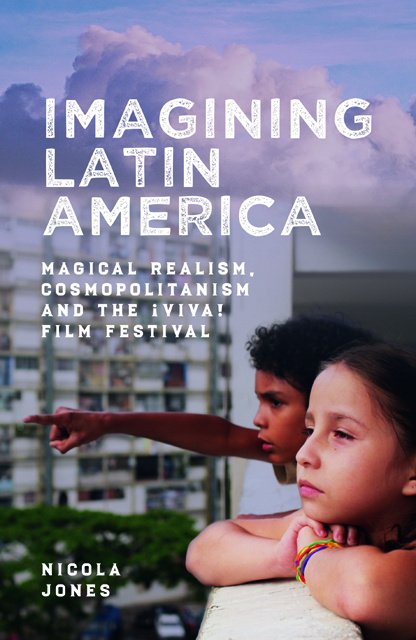Book contents
- Frontmatter
- Contents
- List of Illustrations
- Acknowledgements
- Introduction: Latin American Culture in the UK
- 1 British Identity, Cosmopolitan Anxieties and the Latin American Other
- 2 Latin America and Magical Realism in the British Press (1940–2015)
- 3 Cultural Consumption in Manchester
- 4 The Production of Latin America through ¡Viva!
- 5 Consuming Latin America through ¡Viva!
- Conclusion
- Appendix 1: Analysis of the British Press (1940–2015)
- Appendix 2: ¡Viva! Post-Screening Questionnaires and Interviews
- Bibliography
- Index
5 - Consuming Latin America through ¡Viva!
Published online by Cambridge University Press: 14 January 2023
- Frontmatter
- Contents
- List of Illustrations
- Acknowledgements
- Introduction: Latin American Culture in the UK
- 1 British Identity, Cosmopolitan Anxieties and the Latin American Other
- 2 Latin America and Magical Realism in the British Press (1940–2015)
- 3 Cultural Consumption in Manchester
- 4 The Production of Latin America through ¡Viva!
- 5 Consuming Latin America through ¡Viva!
- Conclusion
- Appendix 1: Analysis of the British Press (1940–2015)
- Appendix 2: ¡Viva! Post-Screening Questionnaires and Interviews
- Bibliography
- Index
Summary
For over twenty years, ¡Viva! has presented Manchester (and British) audiences with first Spanish and then Spanish-speaking cinema. This chapter analyses ¡Viva!’s contemporary non-Latin American audiences and their consumption of Latin America through the film festival. Through the analysis of post-screening questionnaires and interviews conducted at ¡Viva! in 2014, I analyse the ways in which Latin America is decoded by non-Latin American members of the festival audience and subsequently used within their construction of self-identity.
Some of my questionnaire respondents decoded Latin American culture and society through ¡Viva! films in terms of a universality to human experience, while others highlighted notions of social and cultural difference to the UK. Often (though not always) this was influenced by the particular narrative and context of the film the consumer had just viewed. Seemingly contrary notions of similarity and difference were likewise decoded from ¡Viva! films by my interviewees. However, the broader narratives and understandings of Latin America produced by interviewees at the stage of reproduction, which Stuart Hall (2006) described as the stage at which a decoded meaning is articulated in practice, firmly recognised and re-established a sense of the region’s social and cultural difference to the UK. This sense of Latin American difference was frequently articulated through codes, themes and narratives concerning the region’s odd and crazy social and cultural characteristics, reminiscent of the discourse of magical realism evident in the British press as discussed in chapter 2, as well as notions of the quirky and surreal encoded into Latin America through ¡Viva! in chapter 4. More than representing a mere dominant-hegemonic decoding (Hall, 2006) of Latin America through the festival, or a compliance with a wider discourse in the UK on Latin America, however, the primary function of these codes and narratives was ultimately the construction of cultural difference for the purposes of cosmopolitanism. Prominent scholars of cosmopolitanism, such as Ulf Hannerz (1996) and Kwame Anthony Appiah (2007b), have readily acknowledged that cosmopolitanism requires a respect and even desire for cultural differentiation. In this chapter, I draw on interview data to go one step further and argue that the cosmopolitan’s desire for contrasts not merely passively recognises and desires but actively constructs Latin America as different (but not too different) from the UK.
- Type
- Chapter
- Information
- Imagining Latin AmericaMagical Realism, Cosmopolitanism and the ¡Viva! Film Festival, pp. 141 - 172Publisher: Boydell & BrewerPrint publication year: 2021



